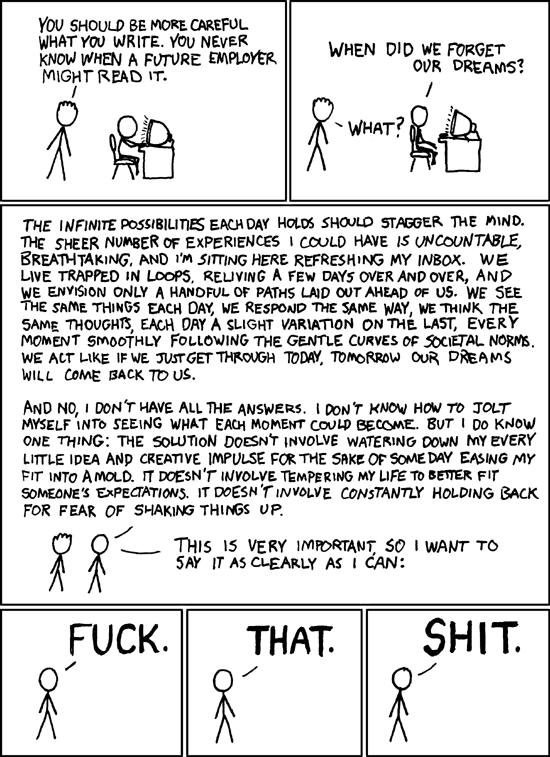
Image via Geekologie.




You can relate a funny story involving a real celebration or you can make up something completely fictional. It can be short or long, any genre. If you don't want to put it into the comments section, email it to me at estallsworth@comcast.net. Just make sure you put in a comment mentioning that you did that. I will then randomly select a winner.Randomly!?! Kids, we don't even have to be good at this to win! WHOO-HOO! Contest deadline is April 30th, so lick your pencils and get scribbling!

Liz is an untreated haemophiliac who is trapped in a cabin due to a blizzard. She gets a paper-cut. She decides not to panic. She binds the wound tightly, then remains still and calm while she waits out the blizzard.Alternately:
Liz is an untreated haemophiliac who is trapped in a cabin due to a blizzard. She gets a paper-cut. As she watches the blood ooze out, horror makes her scalp prickle. She begins to shake, and then to cry with fear. Her mind scurries, trying to think of a way for her to get to civilization now, so this can be dealt with.A story starting with the second scenario would be more likely to hang onto its readers, not because Liz has become a more likable protagonist (she hasn't) but because she cares deeply about what has happened. Her panic, if not her plight, is something the reader can empathize with.

Did you get caught up by somebody else’s indignation on the Internet, firing off e-mails of your own and fuming at the unfairness of life instead of writing about it? If that’s where you wanted your emotional and creative life to go, you’re in good shape. If it isn’t, get over whatever it was that stole your mind and get back to where you want to be.

[I]f you're a writer, and you're changing your career path based on a blog, you aren't thinking long and hard enough about this business.(Emphasis mine.)
I've walked the walk for a long time. Your mileage my vary. Don't give up your agent search because I'm pondering aloud about the future. Don't rush to put your stuff up on Kindle without fully understanding and weighing the potential costs vs. benefits.
I haven't seen much crap doing well on Amazon, no matter how cheaply it's priced. But some good writers (such as Mark Terry) seem to get overlooked. Then again, there are plenty of good writers trying to break into New York who are getting overlooked too.In other words, don't jump into this. It's not a silver bullet. If you go this route, be smart and realistic about what to expect.
For me, print has officially become a subsidiary right. If I ever sign another print deal, it will be to supplement my ebook income.Paper as the subsidiary right? That's a huge paradigm shift--and it's not one I welcome because, as I mentioned in the comments of this previous post, when you make something available only online, you're essentially denying it to the poor. It's hard for us computer junkies to wrap our brains around this, but not everyone owns a computer.



But there's no sense crying over every mistakeThere's a good mantra for everyone chasing a dream, isn't it? Set-backs are to be dealt with by cake and perseverence.
You just keep on trying 'til you run out of cake


Humans can comfortably keep track of three different mental states at a time, Ms. Zunshine said. For example, the proposition “Peter said that Paul believed that Mary liked chocolate” is not too hard to follow. Add a fourth level, though, and it’s suddenly more difficult. And experiments have shown that at the fifth level understanding drops off by 60 percent, Ms. Zunshine said. Modernist authors like Virginia Woolf are especially challenging because she asks readers to keep up with six different mental states, or what the scholars call levels of intentionality.And Excerpt 0010:
Perhaps the human facility with three levels is related to the intrigues of sexual mating, Ms. Zunshine suggested. Do I think he is attracted to her or me? Whatever the root cause, Ms. Zunshine argues, people find the interaction of three minds compelling. “If I have some ideological agenda,” she said, “I would try to construct a narrative that involved a triangularization of minds, because that is something we find particularly satisfying.”
To Mr. Flesch fictional accounts help explain how altruism evolved despite our selfish genes. Fictional heroes are what he calls “altruistic punishers,” people who right wrongs even if they personally have nothing to gain. “To give us an incentive to monitor and ensure cooperation, nature endows us with a pleasing sense of outrage” at cheaters, and delight when they are punished, Mr. Flesch argues. We enjoy fiction because it is teeming with altruistic punishers: Odysseus, Don Quixote, Hamlet, Hercule Poirot.So Excerpt 0001 notes there are limits to how many layers a reader can keep straight in their head. "She knows that he knows" and "She knows that he knows that she knows" are easy to grasp. Add another layer, as in "She knows that he knows that she knows he knows", and our brains start having difficulty.

